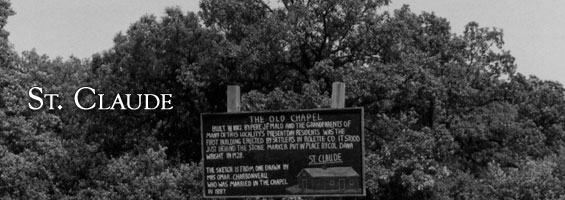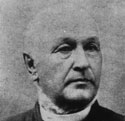We’ve launched a new web portal! Visit findhistory.nd.gov to search our collections.
Due to a road closure, the Killdeer Mountain Battlefield State Historic Site is temporarily closed.

The St. Claude State Historic Site was deeded to the State of North Dakota in 1927 as a memorial to Father John Malo. It is located about two miles northwest of present-day St. John, Rolette County. The site contains the archeological remains of an 1882 mission and its cemetery. A stone marker on the site bears the inscription: “The Old Mission, St. Claude, May 3, 1882 by Pere J. F. Malo.” A larger wooden sign describes some of the history of the site, and depressions mark several of the forty-seven graves recorded in the parish cemetery registry.

Father John Malo, a missionary priest, came to the Turtle Mountains in 1881 with settlers from Quebec, Canada, to found a mission. He built a small log building, twenty feet by forty feet, with living quarters in the attic and a chapel on the main floor. Father Malo christened the mission St. Claude and opened the church on May 3, 1882. Later, the parish grew as Métis families moved in from the Red River settlements in Manitoba, and an addition, equal in size to the original building, was built onto the chapel.
When the St. Paul, Minneapolis, and Manitoba Railroad reached the area in the mid-1880s, it was decided that the church should be relocated closer to the railroad line. The St. Claude mission buildings were abandoned, and a new wood-frame church, St. John the Baptist, was built in 1887, two miles from St. Claude. This new church became the nucleus of the town of St. John.
SHSND Address:
612 East Boulevard Ave.
Bismarck, North Dakota 58505
Get Directions
SHSND Hours:
Museum Store: 8am - 5pm M-F; Sat. & Sun. 10am - 5pm.
State Archives: 8am - 4:30pm., M-F, except state holidays, and 2nd Sat. of each month, 10am - 4:30 pm.
State Historical Society offices: 8am - 5pm M-F, except state holidays.
Contact SHSND:
phone: 701.328.2666
email: history@nd.gov